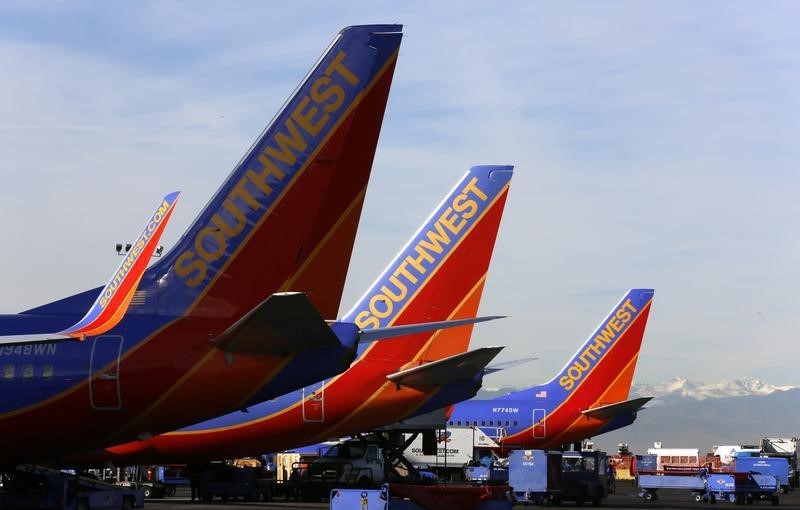By Douwe Miedema
WASHINGTON (Reuters) - Last month's move by the U.S. commodities regulator to let Southwest Airlines Co keep its multibillion-dollar oil trades secret for 15 days offered the world's biggest low-cost carrier a break it has been seeking for three years.
However, the decision to grant the airline an exemption from rules calling for greater derivatives transparency raised concerns about its market impact and sparked a debate among regulators, according to people familiar with the approval process.
All other swap trades except Southwest's must be reported "as soon as technologically practicable."
The Dallas-based airline has argued that its deals are so specific that immediate disclosure could cause the market to move against it, adding tens of millions of dollars to its costs.
For years, that argument was not enough to sway the Commodity Futures Trading Commission and its former chairman, Gary Gensler. One concern was that granting an exemption to just one company is unusual and could hurt others in a similar position.
Also, the waiver could set a precedent that would encourage others to seek similar special treatment, restoring a veil over bigger parts of derivative markets.
The agency is already looking into problems the Mexican government is facing in its vast oil hedging program after news organizations, including Reuters, reported on the country's trades using publicly available swaps trading data, said one person familiar with the agency's procedures.
A CFTC spokesman said Tim Massad, Gensler's successor, had issued the waiver to Southwest after his staff had done proper analysis to confirm the company's claims, and the relief was a lot narrower than what the company had originally requested.
But the person familiar with the approval process said the decision caused "a big stink" within the agency.
When Southwest talked to the Commission in 2012 and in 2013, "they couldn't prove their case," the source said. Barring new evidence or a further appeal, Southwest's plea appeared to reach a dead end more than a year ago.
The company had another shot at an exemption when Gensler left this year. It made its case to then-interim Chairman Mark Wetjen, who told the staff to start another study but doubted that a waiver was warranted, said a second source familiar with the CFTC's thinking.
Only after Massad's arrival in June did things start moving. It is unclear what led to his decision to grant the waiver.
LOBBY GROUP
Even those who see merits in granting a waiver have taken issue with the decision to give it to just one company. While the agency frequently issues exemptions from its rules, they generally apply to a wider industry or class of participants, or address a problem specific to one company.
"I'm surprised that they didn't apply it across the market," another person familiar with the situation said.
With its low-cost tickets and clever marketing, Southwest has wide popular appeal. It says it has been on Fortune magazine's list of most-admired companies in the world for 20 consecutive years, and many on Capitol Hill support it.
Southwest hired Delta Strategy Group, a Washington lobbying firm replete with former CFTC staffers to make its case in Congress. Since it started its campaign, the House has passed two bills that would write the waiver into law, although it is far from certain that they would win approval in the new Congress.
"I SEE YOU"
Rodney Davis, a Republican member of the House of Representatives from Illinois, who introduced one of these bills, welcomed the CFTC's waiver.
"It's a good first step to help a company out," Davis told Reuters. "The rule was not initially designed to impact companies like Southwest."
Southwest's hedging program, among the largest and longest-running in the industry, is best known for sparing the airline the pain when oil surged to nearly $150 a barrel in 2008.
While other carriers' energy bills soared, Southwest was buying its jet fuel at half-price because of swaps and options positions it had locked in.
But the size and frequency of its trades in long-term oil contracts allow a small group of dealers at banks to figure out Southwest's positions by crunching the public data, even though the transactions are anonymous, the company says.
The airline "began to get phone calls from other participants in the market saying: 'I see you guys are out there trading,'" Southwest Treasurer Chris Monroe told Reuters.
That meant Southwest had to pay higher prices after the transparency rules came into force in 2012.
Monroe told a Senate committee last year that reporting the trades would add $60 million to Southwest's $6 billion annual fuel bill.
Shedding light on derivative markets that were at the epicenter of the financial crisis is a core goal of the Dodd-Frank Wall Street reform, but non-banks are complaining they sometimes end up as unintended victims.
Yet critics say the waiver allows Southwest to operate in secret, a privilege others do not have. Another concern is that no single player should be so dominant that its trades alone can move prices.

The CFTC's action "looks anomalous and seems to warrant an expanded explanation," said Bart Chilton, a former Democratic commissioner who left the agency in March.
(Reporting by Douwe Miedema; Editing by Tomasz Janowski and Lisa Von Ahn)